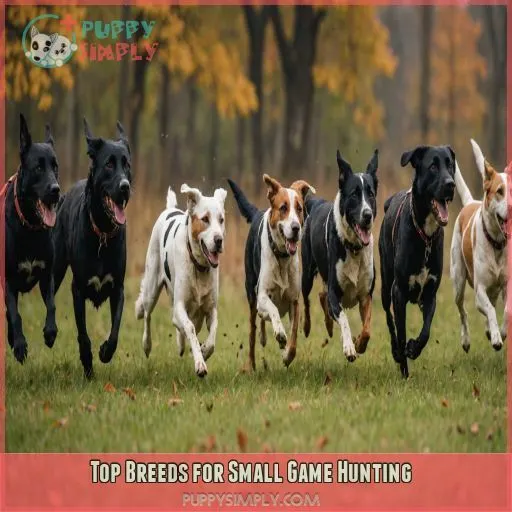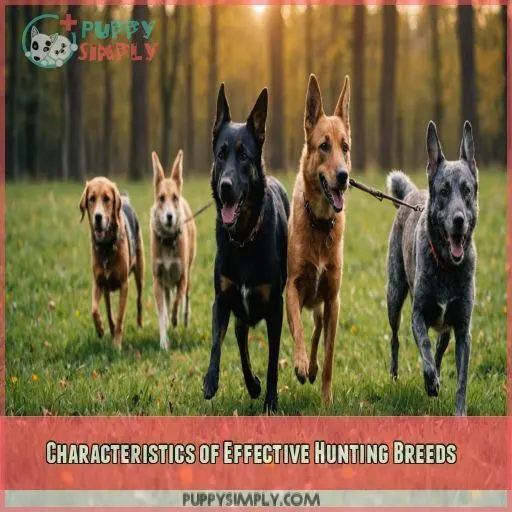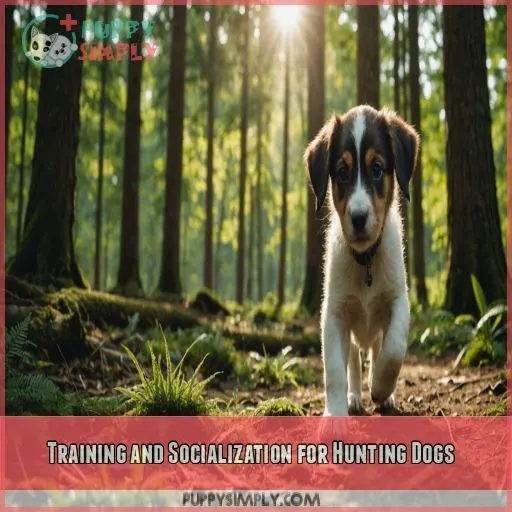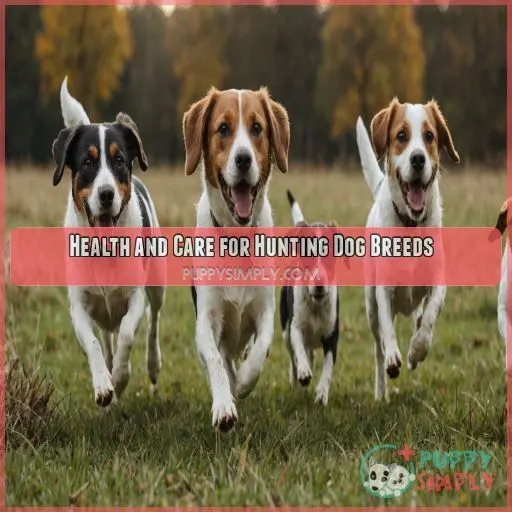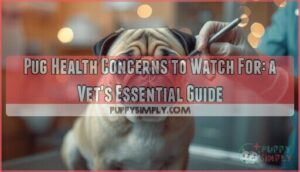This site is supported by our readers. We may earn a commission, at no cost to you, if you purchase through links.

For small game hunting, you’ll want breeds with strong prey drive, excellent noses, and agility.
Top picks include energetic breeds like Beagles and Jack Russell Terriers for fast-paced hunts, while calm breeds like Basset Hounds and Cocker Spaniels excel at stealthy approaches.
The best hunting dog breeds for small game are out there – and with a little know-how, you’ll be well on your way to finding your new hunting buddy!
Table Of Contents
- Key Takeaways
- Top Breeds for Small Game Hunting
- Characteristics of Effective Hunting Breeds
- Strong Prey Drive and Instinct
- Excellent Nose and Tracking Ability
- Agility and Endurance for Long Hunts
- Intelligence and Trainability
- Loyalty and Affection Towards Owners
- Best Breeds for Rabbit Hunting
- Top Breeds for Squirrel Hunting
- Breeds for Bird Hunting and Retrieval
- Breeds for Hunting Small Mammals
- Breeds for Hunting Waterfowl
- Training and Socialization for Hunting Dogs
- Health and Care for Hunting Dog Breeds
- Frequently Asked Questions (FAQs)
- Conclusion
Key Takeaways
- When you’re on the hunt for the perfect furry sidekick, you’ll want breeds with strong prey drive, excellent noses, and agility – trust us, it makes all the difference between a successful hunt and a frustrating one!
- You’ve got to choose a breed that’s right for your hunting style and the type of small game you’re after – don’t be afraid to ask breeders for guidance, and research breeds that fit your needs and lifestyle.
- With the right training and socialization, energetic breeds like Beagles and Jack Russell Terriers can become loving family members, tolerating little hands and noisy playrooms – so, yes, small game hunting breeds can be kid-friendly!
- Owning a hunting dog is like adding a new family member – it’s a ‘paws-itive’ investment – so be prepared to budget for food, vet bills, and training, but know that the loyalty and hunting memories are priceless.
Top Breeds for Small Game Hunting
If you’re looking for a dog to help you hunt small game, you’ll want a breed that’s energetic, agile, and has a strong prey drive to help you succeed. From fast-paced breeds like the Beagle and Jack Russell Terrier (Source) to calm and stealthy breeds like the English Setter , there’s a perfect breed out there for you, regardless of your experience level or the type of small game you’re after.
Energetic Breeds for Fast-Paced Hunts
You’re on the hunt for a high-energy breed that can keep up with your fast-paced hunting style! For sma
Agile Breeds for Dense Terrain
When hunting in dense terrain, you need a dog that’s agile and can keep up. Consider breeds like the German Shorthaired Pointer, English Springer Spaniel, or Brittany Spaniel (Source). These dogs excel in moving through thick cover and can be trained for terrain-specific hunting . Incorporate agility exercises into their training to improve their skills.
Calm Breeds for Stealthy Approaches
You’re on the hunt for calm breeds that can help you sneak up on your prey. For stealthy approaches, consider these breeds:
- Basset Hound: Their calm demeanor and keen noses make them perfect for slow and quiet hunts.
- Beagle: Friendly, curious, and energetic, but also relatively calm, making them great for beginners.
- Cocker Spaniel: Gentle, outgoing, and love to please, which makes training a breeze.
- Whippet: Quiet, laid-back, and wickedly fast, Whippets are perfect for sneaking up on small game.
Breeds for Specific Small Game Types
If you’re looking for the right dog breed for small game hunting, you need one that’s perfect for the job. Here are some top picks:
| Game Type | Breed | Why They Excel |
|---|---|---|
| Rabbit Hunting | Beagle | Exceptional nose and energetic drive |
| Squirrel Hunting | Jack Russell Terrier | Agile and fearless in dense terrain |
| Bird Hunting | Cocker Spaniel | Gentle mouth and excellent flushing ability |
| Waterfowl Hunting | Boykin Spaniel | Strong retrieving instinct and love of water |
Choose the right breed for your small game hunting needs, and you’ll be on your way to a successful hunt!
Breeds for Beginners and Seasoned Hunters
Finding the right hunting dog for you, whether you’re a beginner or a seasoned hunter, is all about finding the right match. You want a dog that’s excited to work with you, but not too high-strung. Here are some top breeds for small game hunting that fit the bill:
- Beagles: Friendly, curious, and energetic, beagles are perfect for beginners.
- Brittanys: Agile and affectionate, Brittanys excel in dense terrain.
- Cocker Spaniels: Gentle and outgoing, Cocker Spaniels shine in flushing small game.
- German Shorthaired Pointers: Versatile and athletic, GSPs are ideal for seasoned hunters.
Characteristics of Effective Hunting Breeds
When you’re on the hunt for small game, you want a dog that’s got the skills and instincts to help you bring home the bacon – or in this case, the rabbit or squirrel. Effective hunting breeds share certain characteristics, like a strong prey drive, excellent nose, agility, intelligence, and loyalty, that make them invaluable partners in the field. (Source)
Strong Prey Drive and Instinct
If you’re looking for a dog to help you hunt small game, a strong prey drive and instinct are really important.
You want a breed that’s naturally inclined to chase and catch, like the energetic Airedale or agile Beagle.
But remember, developing their prey drive needs careful training and socialization.
This way, you can make sure your dog’s instincts are sharpened, not dangerous.
Excellent Nose and Tracking Ability
Now that we’ve covered strong prey drive and instinct, let’s talk about excellent nose and tracking ability. A good hunting dog’s nose is its superpower. Here are four key aspects to keep in mind:
- Scent glands: Some breeds have more developed scent glands, making them naturals at tracking.
- Nose training: Teach your dog to use its nose through scent work exercises.
- Tracking techniques: Practice tracking in various environments to improve your dog’s skills.
- Breed comparison: Research breeds known for their exceptional tracking abilities, like Bloodhounds or Coonhounds.
Agility and Endurance for Long Hunts
You’re on the hunt for a dog that can keep up with you all day. For small game hunting, agility and endurance are key. Your dog needs to be able to jump, dodge, and weave through dense terrain with ease. Here’s what to look for:
| Breed Characteristics | Why They Matter |
|---|---|
| Athletic build | Enables fast, agile movements |
| Robust stamina | Allows for long hours of hunting |
| Strong joints | Supports repetitive jumping and landing |
| Good cardiovascular health | Helps your dog recover quickly between sprints |
Intelligence and Trainability
When you’re looking for a hunting dog, intelligence and trainability are super important. You want a dog that can learn quickly and adapt to new situations. Smart breeds like Pointers, Retrievers, and Spaniels are great for this. With the right training methods, they’ll pick up commands in no time. Here are some key takeaways:
- Stay patient: Training challenges will arise, but with time and practice, your dog will master the skills.
- Know your breed: Understand the unique characteristics of your dog’s breed to tailor your training approach.
- Celebrate successes: Share your success stories with fellow hunters and learn from their experiences to improve your training techniques.
Loyalty and Affection Towards Owners
When you’re thinking about hunting dog breeds, loyalty and affection for their owners are just as important as hunting skills.
A strong owner-dog bond makes training easier and improves overall performance.
Different breeds have their own unique loyalty traits, but all dogs thrive on social interaction and emotional connection.
Nurturing this bond enhances hunting success, but it also strengthens your relationship and sense of belonging.
Best Breeds for Rabbit Hunting
Now that we’ve covered loyalty and affection, let’s hop to it – rabbit hunting, that is! For rabbit hunting, you’ll want breeds with strong prey drive and agility. Consider the Beagle, French Brittany, or English Setter. These breeds excel at sniffing out and chasing down rabbits. Remember to always follow rabbit hunting laws and safety guidelines for a successful hunt.
Top Breeds for Squirrel Hunting
Now that we’ve covered rabbit hunting, let’s tackle those bushy-tailed critters – squirrels! For squirrel hunting, you’ll want breeds with exceptional treeing skills and scent work. The Foxhound and Mountain Cur are top picks, with their keen noses and agility. Don’t forget the right gear and knowledge of the best hunting areas for a successful squirrel hunt.
Breeds for Bird Hunting and Retrieval
Now that we’ve covered squirrel hunting, let’s take to the skies! For bird hunting and retrieval, you’ll want a breed with strong prey drive, excellent nose, and agility. Brittanys, Vizslas, and German Shorthaired Pointers are top picks . Look for a retriever temperament and invest in bird dog training for a successful hunt .
Breeds for Hunting Small Mammals
Now that we’ve covered bird hunting, let’s talk about breeds that excel at hunting small mammals like rabbits and hares. For these quick critters, you’ll want a dog with lightning-fast reflexes and a strong prey drive. Look for breeds like the Jack Russell Terrier, Beagle, or Coonhound, which are bred for their speed, agility, and keen noses.
Breeds for Hunting Waterfowl
Now that we’ve covered small mammals, let’s talk waterfowl! For hunting ducks and geese, you need a dog that loves the water and can handle the unique demands of waterfowl hunting. Look for breeds with strong swimming instincts, like Labradors or Chesapeake Bay Retrievers. With the right training and gear, you’ll be bagging birds in no time!
Training and Socialization for Hunting Dogs
As you bring home your new hunting buddy, remember that training and socialization are just as important as the breed itself – a well-trained dog can make all the difference between a successful hunt and a frustrating one. By investing time in basic obedience, advanced training, and socialization, you’ll be building a strong foundation for a lifelong partnership with your dog that’ll serve you well on and off the field .
Basic Obedience and Commands
You’re excited to hit the hunting trails with your new furry sidekick, but before you do, you need to make sure your dog has some basic obedience skills. Master off-leash control with reliable dog recall, and teach your dog to respond to simple commands like sit-stay-fetch. Introduce hunting signals to get them ready for the action ahead.
Advanced Training for Hunting Scenarios
Now that your dog has mastered basic obedience, it’s time to get specific with advanced training for hunting scenarios.
Focus on scent discrimination, field trials, and decoy work to simulate real-life hunts.
Don’t forget water retrieval and gunshot desensitization to prepare your dog for the loud and unpredictable.
This is where the magic happens – and your dog becomes a skilled hunting buddy.
Socialization With Other Dogs and Humans
You’re prepping your pup for hunting, but don’t forget the importance of socialization. A well-socialized dog is key to a successful hunt. Imagine your dog ignoring a squirrel because it’s too busy playing with another dog – not ideal. Here are three essential socialization tips:
- Dog park etiquette: Teach your pup to play nice with others.
- Puppy socialization classes: Get your pup interacting with other dogs and humans from an early age.
- Leash training: Practice walking your pup on a leash to help them get used to human interaction and pack dynamics.
Desensitization to Loud Noises and Guns
Get your pup comfortable with loud noises, especially gunshots. Noise sensitivity can be a major issue for hunting dogs. Use training methods like early exposure and gradual desensitization to help them get used to the bang. Start with low-level noises and reward calm behavior. With patience and consistency, your furry friend will be gunshot-ready in no time.
Building Trust and Communication With Owners
Now that you’ve desensitized your hunting dog to loud noises and guns, it’s time to build trust and communication. Consistency and patience are key. Use positive reinforcement techniques, like treats and praise, to encourage good behavior.
- Pay attention to your dog’s body language cues, like a wagging tail or raised ears, to gauge their excitement or anxiety levels.
- Establish clear communication by using specific commands and hand signals for different actions.
- Start early socialization to help your dog become confident and calm in new environments.
Health and Care for Hunting Dog Breeds
As you gear up for small game hunting with your trusty canine companion, you want to make sure they’re healthy and ready to go. By staying on top of common health issues, nutrition, exercise, grooming, and regular veterinary check-ups, you’ll be able to keep your hunting dog breed in top shape and ready for successful hunts.
Common Health Issues in Hunting Breeds
As a hunting dog owner, you want to keep your furry friend healthy and happy. But, let’s face it, hunting breeds are prone to certain health issues. Here are some common ones to watch out for:
| Health Issue | Symptoms | Prevention |
|---|---|---|
| Hip dysplasia | Limping, arthritis | Responsible breeding, exercise management |
| Joint problems | Stiffness, pain | Regular exercise, weight management |
| Allergies | Itching, skin issues | Flea control, hypoallergenic food |
| Eye conditions | Redness, discharge | Regular eye exams, protective gear |
Keep an eye on these potential problems to make sure your hunting buddy stays by your side for years to come!
Nutrition and Diet for Optimal Performance
As a hunting dog owner, you want your furry friend to perform at its best. Proper nutrition is key. A well-balanced diet that meets your dog’s energy needs is essential. Consider the following:
- High-quality food: Look for nutrient-rich kibble specifically formulated for hunting breeds.
- Supplements: Add joint support and omega-3 fatty acids to reduce inflammation.
- Hydration: Make sure your dog has access to clean water at all times.
- Treats and timing: Reward with healthy treats and feed meals at consistent times.
Exercise and Conditioning for Hunting
Now that you’ve got your dog’s nutrition dialed in, it’s time to get them in shape for hunting season. A well-conditioned dog is less likely to get injured and can perform at their best. Here’s a general outline to get you started:
| Pre-Season (8-12 weeks) | In-Season | Off-Season |
|---|---|---|
| 30-minute walks, 3 times a week | 1-2 hour hunts, 2-3 times a week | 30-minute walks, 2 times a week |
| Gradually increase intensity and duration | Focus on active recovery techniques | Incorporate strength training and agility exercises |
| Incorporate hill sprints and interval training | Monitor hydration and adjust as needed | Reduce exercise intensity and focus on maintenance |
| Focus on injury prevention and stretching | Prioritize recovery and rest | Plan for next season’s training |
| Develop a customized training plan | Adjust training based on performance | Stay consistent and patient |
Grooming and Coat Care for Hunting Breeds
Grooming is really important for your hunting buddy’s comfort and performance. Regular brushing prevents matting, reduces shedding, and distributes skin oils for a healthy coat. Bathe them as needed, but not too frequently, as this can strip their coat of its natural oils. Be prepared for seasonal coat changes and adjust their grooming routine accordingly.
Regular Veterinary Check-Ups and Care
Regular veterinary check-ups are really important for your hunting dog’s health. Schedule annual vaccinations, parasite prevention, and dental care to prevent costly issues down the line. As your dog ages, prioritize senior care and be prepared for emergencies with a first aid kit. Your vet is a valuable partner in keeping your hunting buddy healthy and thriving.
Frequently Asked Questions (FAQs)
Are small game hunting breeds suitable for families with children?
You’re wondering if small game hunting breeds are kid-friendly? Well, the answer is a resounding yes! With proper training and socialization, these energetic dogs can become loving family members, tolerating little hands and noisy playrooms.
Can small game hunting breeds be trained for other tasks?
You can train your small game hunting breed for other tasks, like retrieving or flushing, with patience and consistency . They can even learn to hunt multiple animals, like birds and rabbits .
Do small hunting breeds require a lot of daily exercise?
Did you know 60% of hunting dogs are under-exercised? You’ll want to make sure your small hunting breed gets at least 30 minutes of daily exercise, or they’ll be bouncing off the walls – literally!
How do I choose the best breed for my hunting needs?
Choosing the perfect hunting breed can be overwhelming, but don’t worry, friend!
Start by considering your hunting style, terrain, and the type of game you’re after.
Then, research breeds that fit your needs and lifestyle.
You’re on the hunt for the perfect breed – literally!
Consider your hunting style, terrain, and the type of game you’re after.
Research breeds that excel in these areas and don’t be afraid to ask breeders for guidance.
What are the costs associated with owning a hunting dog?
Owning a hunting dog is like adding a new family member – it’s a ‘paws-itive’ investment! You’ll need to budget for food ($50-75/month), vet bills ($500-1,000/year), and training ($1,000-2,000/year), but the loyalty and hunting memories are priceless.
Conclusion
Finding the perfect furry sidekick is a million times easier with the right know-how.
You’re a pro at pinpointing great breeds for small game hunting.
Energetic Beagles, stealthy Basset Hounds, and agile Jack Russell Terriers are just a few of the best hunting dog breeds for small game.
Whichever breed you choose, remember strong prey drive, excellent noses, and agility are key.
With your new hunting buddy by your side, get ready for a season of successful and ridiculously fun hunts!

